#there are members of the faction around jane that seem to be interacting with mary or speaking for or with her much more directly in
Explore tagged Tumblr posts
Text
Yet, even Chapuys, who gives us this information, says earlier in the same letter that ‘there had been… talk of a new marriage for this king… which rumour agrees well with my own news from the court of France, where, according to letters [I have] received, courtiers maintain that this king has actually applied for the hand of Francis’ daughter’. Chapuys himself therefore does not connect up the rumours of a ‘new marriage’ with Jane Seymour. In early April, Jane was still little more than a lady whom the king was pursuing. At best, in accordance with the conventions of courtly love, she was the lady whom ‘he serves’ – a telling phrase. At worst, she was a passing fancy, whom Henry may have hoped to make his mistress. Chapuys certainly didn’t think much of Henry’s choice. He described Jane the day before Anne’s execution as ‘no great beauty’ and ‘not a woman of great wit’; he implied that she was unlikely to be a virgin, and reported that people said she was inclined ‘to be proud and haughty’. Yet, by this point, the world had changed, and with it, Henry’s intentions towards Jane. It is highly improbable that before Anne was considered guilty of adultery, Henry had seriously begun to plan to make Jane his wife.
1536: The Year that Changed Henry VIII, Suzannah Lipscomb
"I hear that, even before the arrest of the Concubine, the King, speaking with Mistress Jane Semel of their future marriage [...]"
#suzannah lipscomb#things that make you hmmm...#yeah i remember this part in her first documentary and kind of being like...eh?#i mean. i suppose it's possible that before the arrest = *right* before; as in . once the investigation is completed to the level#of 'preponderance of evidence" needed for arrest warrant#like it is true that chapuys is not making that connection in april. but i'm not sure how instructive we should find that#eustace chapuys#although i think we should maybe find it instructive that he doesn't claim jane is mary's supporter until after anne's arrest#like it is certainly a ...conveniently timed. retrospective rumor/report#there are members of the faction around jane that seem to be interacting with mary or speaking for or with her much more directly in#the months leading up to these events...#it's carew and 'some persons of the chamber' that send a message to mary to be of good cheer#'bears great love and reverence towards the princess' is not a judgement he expresses ; again; until mid may#so it doesn't seem it was all that..evident; necessarily#(like#frankly. that unnamed mistress of 1534 during her time in the beam of royal favour#seemed to have more direct involvement/ communication with mary than jane did...? during the era as mistress.#which i think is why there's been this sort of propulsive instinct to#not only link them but insist they were the same person#but returning to a former mistress was just not something henry...did#one of many reasons it seems implausible--#not just that chapuys described them so differently--#is that it wasn't henry's modus operandi to return to any woman he'd ended things with romantically#to believe it you'd have to believe she was his mistress in 1534; he rejected her/ended the tryst in favor of taking one up with m shelton#and then absented himself from m shelton to return again#i get that the slow burn is a more compelling arc from a storytelling perspective#it just doesn't seem to fit the pattern/ evidence is all....)
3 notes
·
View notes
Note
I was wondering if you could explain Peter and Tony Stark's relationship in the comics. I was reading something along the lines of that they are friends but that Peter did in fact look up to Tony as a father figure once but after Civil War they remained as friends. I don't think Peter ever saw Tony as a father figure but I could be wrong although I do doubt it. Can you help? :)
Sure, I can do that, especially with Endgame Eve upon us and the inevitable return of my gritting my teeth every time someone refers to Tony as Peter’s father figure within comics continuity as well as in the MCU. First things first: I have to say that when I talk about this relationship, I’m speaking as someone who has read far more Spider-Man than Iron Man, and as someone who is far more interested in Spider-Man than Iron Man, although when I first got into Marvel I did read quite a bit of Iron Man-focused things.
That being said, a lot of times when this conversation comes up among people who are fans of Peter Parker in the comics (and who are not fans of what the MCU has done with the character and how they chose to tie him to the Iron Man franchise) it takes on a comics!Tony bashing tone, which is not something I’m interested in doing because I’m not interested in breeding bad feelings between different factions of Marvel fandom – and because I don’t dislike Tony Stark as a character. So my goal here is not to paint Peter as The Good Character and Tony as The Bad Character in some sort of conflict, but to break things down and illustrate that Peter as a character has always been his very best when he’s independent, and that this dynamic wasn’t, ultimately, good for Peter – I suspect it also wasn’t good for Tony, but the fallout from Civil War was a trip for everyone, because Civil War was a very manufactured event that had its characters act in accordance with the plot instead of shaping the plot around the characters. Comics! Anyway: this is a bashing free zone on my part when it comes to the comics, with the exception of Marvel themselves. Marvel, I’m gonna insult. That being said, this is probably going to look lopsided, first because I have to discuss Civil War, because the area around Civil War is where most of this relationship exists, and second because I think the fallout of this relationship is important to discuss and Peter is very, very angry during the fallout.
First things first, and this isn’t exactly the place for this because it’s a much larger topic, but I think both pop culture and fandom have a big problem lumping a whole host of older man/younger man dynamics together: mentor/protege, boss/employee, team leader/team member, and father/son are not all the same dynamic and shouldn’t be treated as such. If I had a dollar for every time “he’s his dad” cropped up in relation to characters (not just Tony and Peter but in general) who just have, like, an age gap between them, I would be sunning myself on a private yacht right now. Not every older man is every younger man’s father, figurative or otherwise, and especially not once both characters are into adulthood. That’s not how relationships work; to simplify them like that removes nuance. In the interests of transparency, there are a few panels where Peter and Tony banter and joke: when Tony is telling him about the features in the new suit he’s building him, Peter jokingly whines “dad c’mon” (Amazing Spider-Man #529), and at one point I believe he makes a joke about wanting to borrow the keys to the car. But these are, you know, clearly jokes coming from a highly sarcastic character who is prone to these kind of wisecracks. There is one panel off the top of my head from One More Day where Peter says Tony was “like a father to him”:
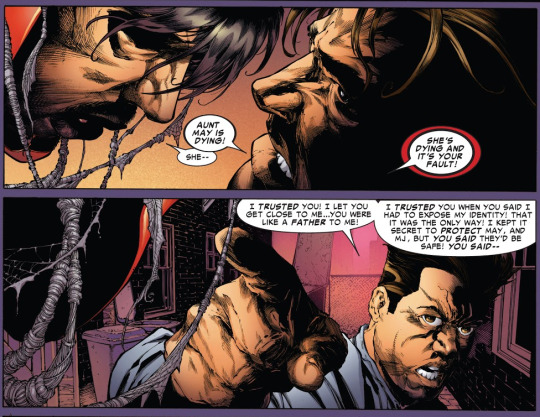
(Amazing Spider-Man #544) As you can see, it’s not a happy scene. I should note this is after Peter has broken into Tony’s home, punched Tony in the face, webbed him up, and forcibly wrenched his faceplate off, if we’re going to talk supposed filial piety. Personally I’ve never liked this line, in part because it doesn’t make sense – this is part of what I was saying about conflating different dynamics with a certain power dynamic at play and then labeling them all father/son. Peter certainly, in the events leading up to Civil War, trusted and respected Tony. He certainly let Tony lead him. There was definitely a mentor/protege thing happening, with Tony doing things like taking Peter to Washington DC with him. But to put it simply: in 616, Tony Stark is simply not old enough for Peter Parker to view him as a father figure. Like with how Peter Parker is often thought of as much younger than he is in fandom, Tony Stark seems to be thought of as older. (This is probably because of either the mustache or the MCU.) Realistically, there can’t be more than a decade between them. Older brother, if we’re going to go the familial feelings route, would be more appropriate than father. It’s also a bit ridiculous to think that Peter, who is a married adult who has lost his own child and has lived through events like his own father supposedly coming back from the dead, would be desperate for a father figure at this point in his life, especially when he wasn’t interested in having one from the superhero set in his teen years. That being said “you were like an older brother/very young uncle to me” doesn’t pack the emotional punch we’re conditioned to register with “you were like a father to me” and I suspect that’s why this line is here for the reader. Alternatively, from a characterization standpoint, if you are both very angry and very desperate and you need someone to do you a large favor even though they won’t be inclined to at that point in time, you might want to pull out the big emotional manipulation guns, and while it’s not stated as such that that’s what Peter’s doing deliberately on the page, if I wanted to reconcile the line with who Peter is in canon, I could buy it. As it is, it just kind of sits there allowing for people to claim that Peter honestly viewed Tony as like a father to him in comics by denying greater context. I’d say if the comics wanted me to buy that Peter honestly felt Tony was like a father to him, they should have done more work, but the problem is that this event happens with decades of characterization behind Peter, and looking at the big picture I just don’t see it happening even if they had put in more work.
(As a person concerned with the integrity of the overall Spider-Man character and narrative, I should say I’m very anti-father figures in Peter’s canon – not only does it erase Peter’s independence, a key component of the character, but it tends to gloss over May as Peter’s primary parental figure, and it warps the narrative around Norman’s twisted desire to have a Perfect Heir in the form of Peter. That being said, if we’re talking about father figures in Peter’s life: shortly before Peter joins the New Avengers, he encounters an older man named Ezekiel who also has spider powers and who tells Peter he can tell him much more about his own powers. Though he’s incredibly enigmatic, Peter develops a fondness for Ezekiel and grows to trust him. Then Ezekiel tries to sacrifice Peter to further fuel his own spider powers. So Peter shouldn’t have much of a taste for father figures at this point in time anyway.)
This got exceedingly long! More under the cut.
Let’s backtrack to the early days of Spider-Man. I’ve mentioned before that independence is very important to Peter, but that doesn’t mean he’s never tried to join a team. In Amazing Spider-Man #1, after all, he tried to join the Fantastic Four – until he learned they didn’t pay. Similarly, in Amazing Spider-Man Annual #3, some years later, the Avengers try to decide whether they should issue an invitation for Spider-Man to join their ranks, and ultimately decide to test him. Peter is unsure whether he really wants to join the Avengers, although he is tempted by the idea of financial security and the public’s respect. His temper’s still pretty hot at this point, and he doesn’t react all that well to the notion of being tested:
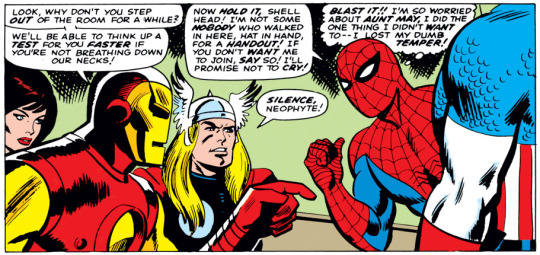
In the end he goes along with the test, passes it, but then decides to pretend like he didn’t because he didn’t care for the actual test. There’s not a whole lot of interaction between Peter and the Avengers for a while in general, beyond the occasional team-up – I’m partial to the one with Jan Van Dyne in Spectacular Spider-Man #105-106. Peter’s got a particularly vibrant supporting cast of his own, and they tend to outshine his hero teamups. I was trying to think of any Iron Man and Spider-Man content I could remember around this point and while they’re probably is some other stuff, what comes to mind is the fight from Amazing Spider-Man Annual #20:
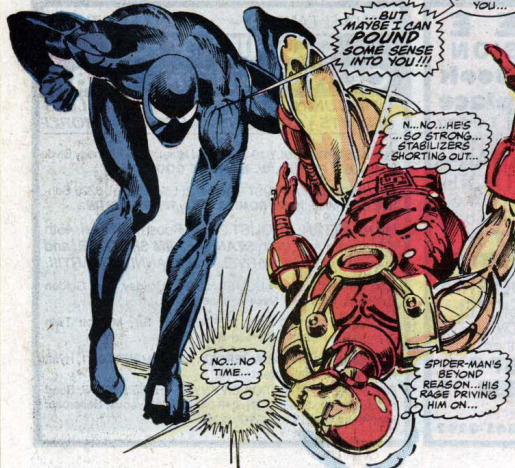
For the record, this isn’t Tony Stark, but Arno Stark, the Iron Man of the future. Peter, however, does not know that; he definitely thinks he’s punching his native Iron Man. (First law of Spider-Man’s aggression: is it an adult man? Peter is willing to punch him in the face. Captain America? Done it. His own clone? Tried to choke him out. It’s just how he is.) So nothing really is sticking out for me re: Peter and Tony specifically having any type of relationship at this point in time. Peter does at one point become a reserve Avenger, although he voices doubts about whether it’s really for him:
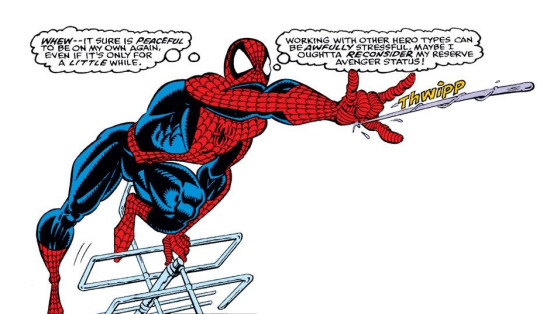
“Maybe I oughtta reconsider my reserve Avenger status!” (Amazing Spider-Man #357)
On the subject of Peter and other heroes, I like this panel from Marvel Knights Spider-Man #2, where Peter talks about how Mary Jane says he has a bad attitude around other superheroes:
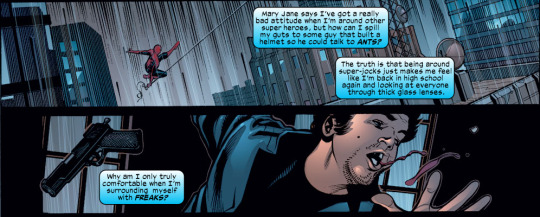
This is admittedly after he broke into Avengers Mansion ostensibly for help but just ended up fighting and arguing with them, so, she’s not wrong. (I pulled this up because I went to reread this scene because I couldn’t remember if Tony is in it, but he’s not.)
So here we are, north of the year 2000, and I would say Tony and Peter don’t really have much of a relationship. There have been times they’ve found themselves in the same battle, and I wouldn’t say either of them dislikes the other, but I don’t think they really think of each other much, either. Peter’s closest superhero connections are, at this point, as they traditionally have been, Daredevil and the Fantastic Four. So what happened?
The answer is simple. In two words: Event hell.
If you’ve spent any time in comic book fandom, you know people have Feelings about events – those big company wide storylines involving every other character and their butler that used to happen every so often and now are basically nonstop. Mostly negative feelings. Events disrupt the flow of individual books, can screw up already in progress storylines, and somebody’s always totally out of character. I’m actually not an event hater in theory; I think they can be done well. On the other hand, these ones I’m about to discuss really suck for Spider-Man, not even in terms of characterization at the time but in terms of getting the ball rolling on what I personally think led us here, to the worst Spider-Man characterization period I have ever seen reading comics. And it starts with Spider-Man becoming a real, full time Avenger.
During a story called Avengers: Disassembled, the Scarlet Witch has a breakdown and as a result kills several Avengers, including Hawkeye and Ant Man. The Avengers disband as a result. Six months later, a supervillain prison breakout brings together a collection of heroes including Captain America, Iron Man, and Spider-Man. Steve and Tony reform the Avengers, and this time invite Peter to join them. Thus, Peter becomes a headliner on the New Avengers title, along with Spider-Woman, Wolverine, and Luke Cage. I’ve said before that I don’t think Peter functions well on team books, and for one reason: he gets underused. With the New Avengers, you had your smart guy (Tony Stark) and you had your strong guys (Luke Cage and Wolverine – even though, in practice, Peter is much stronger than Luke, and has pummeled Wolverine before). He’s not even the only spider-person on the New Avengers lineup. Moreover, New Avengers was written by Bendis, and as much as it pains me to say this about the most vocal Marvel writer supporter of a canonically Jewish Peter Parker: I don’t think Bendis writes a good 616 Peter. The jokes take over. His dialogue lacks his particular 616-ish steel. In short, Bendis writes Peter with too much bark and far too little bite. It’s very noticeable during this period if you compare how Peter is written in New Avengers to how he is written in his own solo, Amazing Spider-Man, which at the time had JMS, who writes an absolutely incredible Peter, on it. Even the way JMS has Peter interact with the other Avengers in ASM is leagues ahead of Bendis on New Avengers:
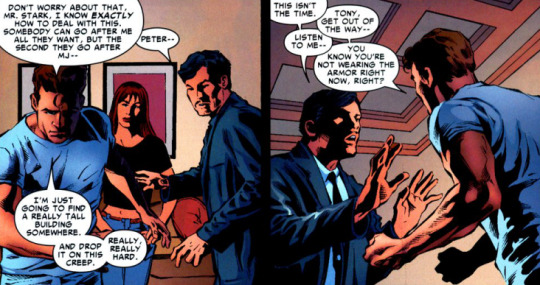
(Amazing Spider-Man #522)
A lot of stuff happens at this point that further binds Peter to the Avengers and, with the Avengers, Tony: an ex-classmate of Peter’s turns himself into a military science experiment gone wrong and burns down Peter’s apartment as well as Aunt May’s home in Queens. Tony then invites Peter, Mary Jane, and May to move into Avengers Tower, which they do. When Mary Jane is caught going into Avengers Tower late at night, a tabloid story starts circulating that she’s having an affair with Tony. Also around here Peter eats a psychic vampire, “dies”, molts, comes back, did I mention he ate a psychic vampire? But nobody ever mentions that part. And at this point, we hit the road to Civil War.
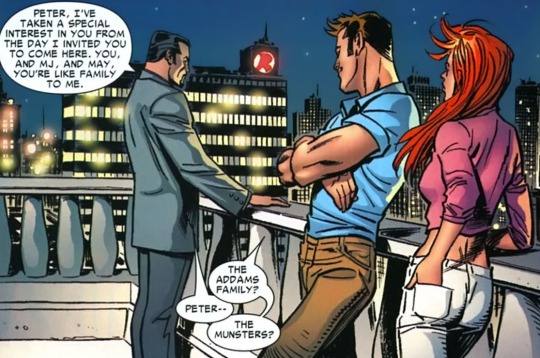
(Amazing Spider-Man #529) I mean, I think you could argue that the Avengers on the whole are like a family, but sure, whatever. I’ll be honest: I think the comic itself at this period in time uses words like “family” in order to foster a sense of a longer relationship history that doesn’t actually exist, although at this point in time Jarvis and May were dating, so I guess that could make things a little in-law-y. It’s also, in story, being used to get Peter to agree with what Tony is pitching him. Anyway, I probably don’t need to explain Civil War but the cliffnotes: big superhero-caused explosion kills a bunch of children, a law is proposed that would make superheroes register with the government the superhero community becomes divided between two sides. There’s the pro-registration side, headed by Iron Man and also by Reed Richards, which favors cooperation with the government. Then there’s the anti-registration side, headed by Captain America. Peter originally starts out on the pro-registration side, swayed by the opportunity Tony presents him to finally unmask to the public and buoyed by his claims that with this movement they can keep Peter’s family safe, which is the reason Peter has kept the mask on all these years – concern that, should he take it off, Mary Jane or May would pay the price. (Wait for it.) Through Tony’s directive, Peter unmasks himself and reveals his identity during a live television press conference. Tony had also made Peter a new, more high tech suit called the Iron Spider, which in addition to being in the Iron Man colors of red and gold also has several golden mechanical spider’s legs.
This alliance between Tony and Peter is shortlived. Peter becomes disillusioned with the pro-registration side and defects, but not before he and Tony have a showdown:
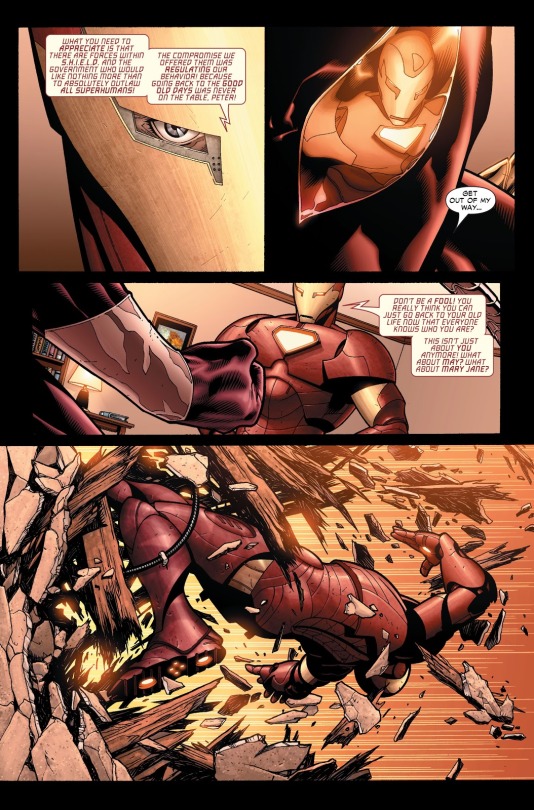
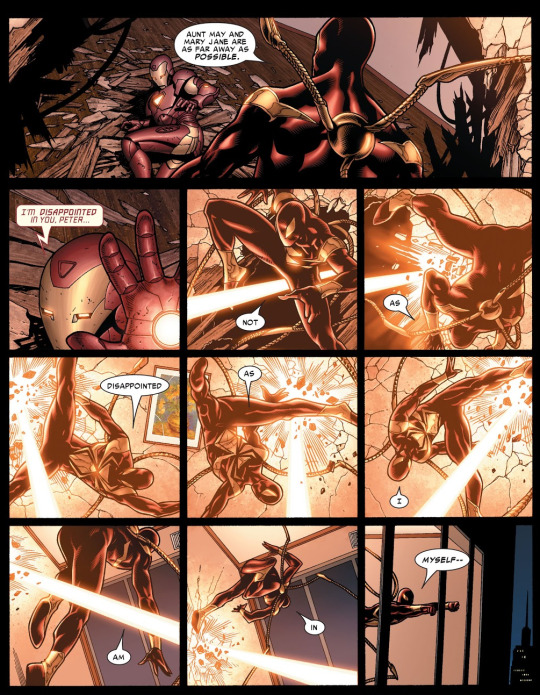
(Civil War #5) You can see how I might have issues with how the MCU has reworked this particular storyline for their movies in regards to Spider-Man’s part in it. It’s not that I think anyone, including Peter, was written to their best during Civil War, but I think it’s disingenuous to take this storyline and attempt to remake it into a father/son dynamic, not only because it severely undermines Peter’s independence, something that marked him as very original as a teenage hero.
So Peter joins the anti-registration side, there’s a big superhero fight, etc etc. Things come to a close when Captain America surrenders, and so the pro-registration side is, technically, victorious. This leaves Peter a fugitive, and Mary Jane and May, who had been hiding out in a motel, his accomplices. Their stint on the run is short; with their safety no longer protected by Peter’s secret identity, his enemies do go after his family. When an assassin targets them, Peter manages to cover Mary Jane before she’s shot – but the bullet hits May as a result. Which brings us back around to the first panel I posted, in the scene where Peter does say Tony was “like a father” to him. With May on life support in the hospital and Peter and Mary Jane unable to reveal her name, Peter goes on a rampage looking for killer. This is actually one of my favorite Spider-Man storylines, called Back in Black, and it takes place between Amazing Spider-Man #539-543, which some absolutely stunning Peter characterization. He’s also incredibly angry at both Tony and at himself during this period.
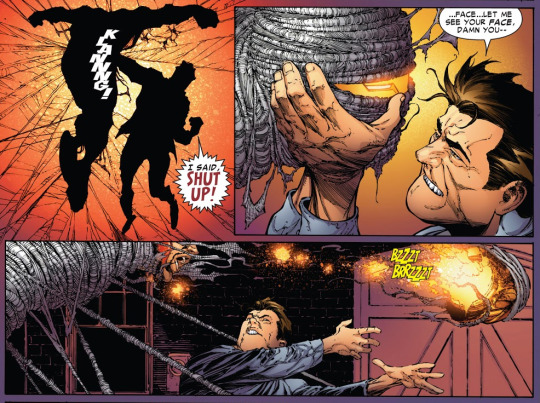
(Amazing Spider-Man #544)
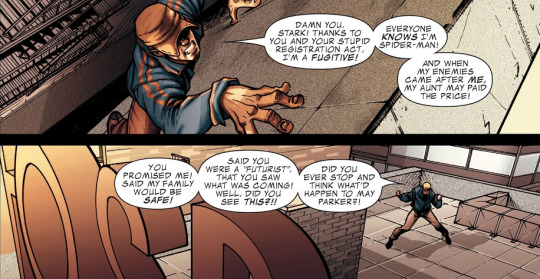

(Avengers: The Initiative #7)
At this point, Tony and Peter go separate ways. Peter sells his marriage to Mephisto for May’s life (comics), and with that deal his secret identity is restored among the general public and Peter continues with his daily life, becoming engrossed in his recently resurrected best friend Harry’s affairs and fighting crime. Tony, iirc, becomes Director of SHIELD, and later deletes his brain (comics) to keep the database containing the identities of other heroes from falling into Norman Osborn’s hands when Norman Osborn essentially takes over the government following his killing the Skrull queen during the Secret Invasion event (comics).
Since then, Peter and Tony have worked together and been on teams together (as much as I would like Peter’s Avengers status to never crop up again because the character simply wasn’t built to function on this kind of a team and nobody seems to know what to really do with him on it except have him crack jokes, with the MCU’s influence I don’t see that happening any time soon) and can get along.
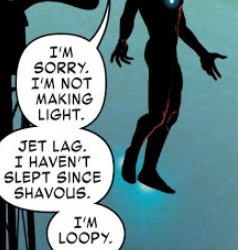
(I do not have the issue number for this panel! But it’s from a fairly recent Invincible Iron Man series.)
I wouldn’t call them close. They’re not going to be the first person either of them calls on in an emergency unless there’s something specific to one of them that the other needs. I definitely wouldn’t call them familial, or say that, in current comics canon, Peter considers Tony to be anything close to a father to him. They’ve been teammates, I’m sure they’ll be teammates again, and at best I think you could call them friends, albeit not especially close ones. And in my opinion, that’s fine; not every character has to be best friends with every other character, and sometimes superheroes are just so far apart in how they operate that they don’t mesh well together, even though they’re both smart guys. I did not mean for this post to get so long, but I hope it helped!
tl;dr: the idea that Peter Parker viewed Tony Stark as a father figure is the byproduct of a very brief period of canon that was necessary to maneuver the characters into the roles they were going to inhabit for the Civil War event – which ultimately went very badly for both of them. The dynamic – or any genuinely close relationship between them – didn’t exist before that, and did not continue to exist afterwards, and it’s my personal opinion that saying Peter looked up to Tony as a father rather than as a mentor is taking the words on the page slightly too literally.
110 notes
·
View notes